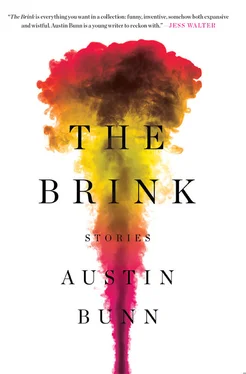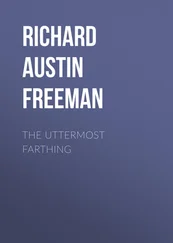“You’ve come this far,” Spike says. “Try going a little bit further.”
Henry steps out of the van and closes his eyes. He takes a moment to notice the cold, a private sign that he is one year older. Soon, his December birthday will come and go and he may never answer the questions his body is asking.
Spike lifts his bag. “Also, you don’t want to deal with the cancellation policy.”
In the hardwood foyer, a pussy-willow branch teeters in a vase like an accusatory finger. Above the telephone stand hangs a photographic portrait of Rigby the retriever slavering in a swatch of autumn light. Henry counts six armchairs in the living room and nothing else. The place seems willfully under-decorated, as if everything might need to be rearranged or cleared for yoga or trust falls. This is precisely how Margot always wanted their home to be — airy, uncluttered. Perhaps now it is, since he was the clutter.
Spike leads Henry up the narrow stairs. “So no cell phone use inside the house, please. And no alcohol, no drugs, no sex, and no plastics. Bodi is environmentally sensitive.”
“Plastics?” Henry asks.
“Some guys think they can bring their rubber gear anywhere.” Spike stops on the landing. “You have no idea what I’m talking about, do you?”
Henry’s room is on the second floor, wedged under one of the gables. It’s the sort of space people turn into a crypt of winter clothes and exercise equipment. A blond young man, Henry guesses midtwenties, lays on one of two twin beds like a deposited doll. He’s dressed in a puffy orange hunting jacket and loafers without socks. With a small terror, Henry understands that this is his roommate.
“Jed,” Spike says, “you know you can take off your jacket.”
“Are there no single rooms?” Henry asks as kindly, diplomatically, as possible. Jed snorts.
“Everybody gets a roommate,” Spike explains, one hand on the doorknob, which, Henry notices, does not have a lock. “If we put people in singles, they just close off to the process.”
“The process. .?” Henry says.
“Of integrating. . And actualizing. . Oh, don’t ask me,” Spike says. “I just cook and fluff the pussy willow.” Spike leaves them to get acquainted, his boots — made for heavy construction — clomping down the stairs.
Jed eyes him bluntly with his sharp, blue eyes. “So are you gay?”
Henry sits on other bed. “I was married for twenty-two years. .” he says, and then stops. He’s not sure where the story goes after that.
Jed leans back. “Thank God.”
Dawn Manor’s resident guru sits in a leather armchair in the living room, wearing a linen shirt and flowy pants that are basically drapes.
“It’s the secrets that kill us,” Bodi says. “And the cure for secrets is stories.”
He’s greyhound-thin, with rimless glasses and the flexibilities of a man half his age; every now and again, he lifts himself up on the armrests, like a gymnast on the bars, to tuck his feet and sit cross-legged. Henry has noticed how Bodi touches things — tabletops, shoulders — with intense, appraising grace. Bodi was an antiques dealer in “a prior life,” he told them over breakfast. “It made me understand that everything has a delicacy that must be protected.”
Four men face Bodi in a scattershot arrangement. Across from Henry, Jed sits on his hands and contemplates his kneecaps. Of the group, Henry is by far the oldest.
“How about you, Doug?” Bodi says, his hands resting upwards on his knees. “Tell us the story of your secret.”
Doug’s gaze relocates from the window to Bodi. He spooks Henry — in a cowboy shirt and stained jeans, Doug gives off stray voltage, mumbling his reluctance under his breath. Even his moustache doesn’t look completely enlisted. Doug works a cigarette from his pocket and Bodi stops him.
“No smoking inside.”
“I just want to roll it between my fingers,” Doug says. “It helps me relax.”
Doug explains that he worked in a shipyard in Bayonne, running the cranes, and “pruning up” in the showers. “I was Jiffy Lube. In and out,” Doug says, and Henry shivers with a revulsion that almost instantly becomes intrigue. Doug’s boss showed up in the showers, fucked him, and fired him the next day. “Those were union showers,” Doug says. “Asshole was management.”
He lights the cigarette and Bodi says, in a first show of authority, “Put the cigarette out or go outside.” Doug smirks and heads out to the porch.
Bodi threshes his hands, recovering the moment. “Henry, what about you? Would you like to say something?”
Henry looks for an entrance, a beginning to what seems like hopeless years of middle. He sees the ghostly bridge of a forearm reaching into his sleeping bag at Boy Scout camp circa 1963. He remembers, as a teenager, imagining his parents dying in a plane crash so he could live with the tenor Jussi Björling in his Italian castle and hold his penis in his hand whenever he wanted to, the secret root of his talent. Then, with a stab of self-loathing, Henry recalls the certain fold and tuck to the coverlet on the guest bed, the way he remade it every time he raided his cache. “In the early part of my marriage,” Henry starts, and it’s like working a stone free from inside him. “I started this extension to my house that I never finished. .”
At the edge of the driveway, Henry and three others stand in a confused huddle, trying to fix a snow break. Bodi sent them out to the lawn to work. “Across cultures, across time, men go outside to go inside,” he told them. A day in, and the platitude per minute of speech ratio is getting to Henry. It’s as if Bodi has learned to turn every sentence inside out, like a sock.
Henry holds a notched wooded brace while Doug sets two four-by-fours into it. Another man, short and talkative, hammers at the juncture point, missing the nail as much as not. His name tag, stuck to the outside of his jacket, reads “Ronnie!” He works as an inspector for the Transit Authority, which, he said earlier, means he can cruise every truck stop on the Turnpike while getting paid.
“I thought this was supposed to be some singles thing,” Doug announces, blowing air into his fist. “Except it turns out I paid eight hundred bucks to fix this guy’s fucking lawn.”
Standing off to the side, Jed giggles in his jacket and loafers.
Doug shoots back, “You think eight hundred bucks is funny?”
Jed retracts his hands inside his sleeves and holes up.
Since the morning, Henry has been feeling increasingly distant, like he has tickets to his life except they’re last row, obscured view. What did he come for? None of the men seem like prospects to him; they’re all as warped and lonely as he is. With a pang, he realizes he’s missing Van, back home, tending to his plants and mail. He must call.
Suddenly, a brown-black flutter of wings explodes from behind the trees. Canada geese, gathering into a migration.
Jed watches them, his mouth open. “How far do they go?”
“Delaware, Maryland, I think,” Henry says.
“Outside Bethesda, some guy held a knife to my throat until I swallowed,” Ronnie says. “That’s Maryland in a nutshell.”
Gunshots pop from behind the Manor, out of view. Henry flinches. Hunters. The geese go wild, squawking. “Shit, it’s Vietnam up here,” Doug says.
Then Henry notices that there are tears rolling down Jed’s cheeks, and the kid makes no effort to wipe them away. “Are you all right?” he asks.
“It’s something that happens sometimes, from my meds,” Jed says. “I don’t have control over it.”
A bell peels at the front porch: Bodi calling them inside. Doug collects the tools and shoves them at Jed, saying, “You carry them, since you didn’t do jack shit.” The others head back, but Henry lingers with Jed. They’re roommates, after all, and this is what roommates do. He notices, at his ankle, a little strip of skin. Even in the cold, the kid’s not wearing any socks. Up close, out here in the bracing cold, he sees that Jed is older than he thought, with difficult skin. He’s not so much young as preserved. Last night, in bed, Jed told him his father runs a Christian school in Pennsylvania. “Goliath was ‘ uncircumcised ,’” Jed whispered. “That’s what the Bible says.” Henry turned off the light and said, “Look, don’t give me nightmares.”
Читать дальше











